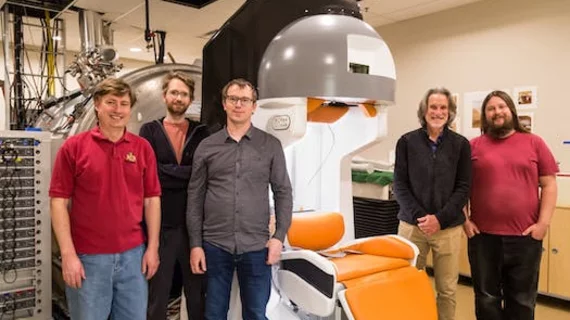Curbside MRI: Experts are developing system small enough to fit in a pickup
Someday, getting an MRI exam could be as simple as having food delivered to your door—at least that is the hope of a group of experts at the University of Minnesota, who are working on a compact system said to fit in the back of a pickup truck.
Researcher Michael Garwood, who is the associate director of the University of Minnesota’s Center for Magnetic Resonance Research, and colleagues have been working to develop what could be one of the world’s most compact portable MRI systems. The prototype is said to be small enough to fit in the bed of a truck and operate on a typical run-of-the-mill hardware store generator.
The team’s goal is to increase accessibility to MR imaging in rural and underserved areas without sacrificing the vital exam’s diagnostic quality. Although most MRI systems are engineered to be fixed to walls, ceilings and floors of hospitals or imaging facilities, Garwood sees no reason why compact systems cannot meet patients where they are.
"There's no reason, no physics, that I can think of that says it's unsafe, but we have to go through that process because it's such a radically different kind of scanner," Garwood told Minnesota’s Star Tribune. "We take it to the people rather than the people coming to the large medical centers."
Compared to larger fixed systems with stable magnetic fields, Gardwood’s approach involves a cascade of multiple radio frequencies. This addresses the issue of unstable magnetic fields related to smaller systems while also offering comparable image quality.
The 800-pound magnet sits on wheels and looks like a small throne. It can be detached from its power source and rolled to different locations as needed.
It does come with high engineering costs, but Garwood believes that it could one day be more cost-effective than traditional MRIs because it does not require nearly as much power or liquid helium as fixed systems.
The prototype is the result of funding through former President Barack Obama's $5 billion brain initiative and a collaboration between teams at Harvard, Yale and Columbia and electrical experts in Brazil and New Zealand.
So far, the university’s prototype has only been tested on small items, like lemons and water bottles, but as soon as it passes necessary safety inspections, the team plans to initiate human trials as early as this summer.

